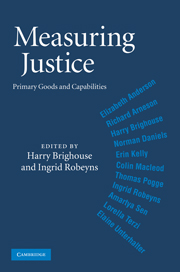Book contents
- Frontmatter
- Contents
- List of contributors
- Acknowledgments
- 1 Introduction: Social primary goods and capabilities as metrics of justice
- PART I THEORY
- 2 A critique of the capability approach
- 3 Equal opportunity, unequal capability
- 4 Justifying the capabilities approach to justice
- 5 Two cheers for capabilities
- PART II APPLICATIONS
- PART III CONCLUDING ESSAY
- Index
- References
5 - Two cheers for capabilities
Published online by Cambridge University Press: 05 June 2012
- Frontmatter
- Contents
- List of contributors
- Acknowledgments
- 1 Introduction: Social primary goods and capabilities as metrics of justice
- PART I THEORY
- 2 A critique of the capability approach
- 3 Equal opportunity, unequal capability
- 4 Justifying the capabilities approach to justice
- 5 Two cheers for capabilities
- PART II APPLICATIONS
- PART III CONCLUDING ESSAY
- Index
- References
Summary
What is the best standard of interpersonal comparison for a broadly egalitarian theory of social justice? A broadly egalitarian theory is one that holds that justice requires that institutions and individual actions should be arranged to improve, to some degree, the quality of life of those who are worse off than others, or very badly off, or both. I shall add the specification that to qualify as broadly egalitarian, the theory must in some circumstances require action to aid the worse off or very badly off even when such action would not maximize the aggregate sum of utility, welfare, or well-being. Any such view needs a standard of interpersonal comparison that allows us to distinguish better-off from worse-off persons. Recently two types of standard have attracted adherents. One is the resource-oriented approach developed by John Rawls and others, and the other is the capability approach associated with the work of Amartya Sen and Martha Nussbaum (Nussbaum 1988, 1999, 2006; Sen and Nussbaum 1990; Sen 1992, 1993; Rawls 1996, 1999). Rawls has affirmed that the proper measure is an index of primary social goods: flexible, multi-purpose resources such that any rational person wants more rather than fewer of them.
Sen presents the capability approach as correcting a basic flaw in Rawls's suggestion. To see the criticism, suppose for simplicity that the resourcist ranks people's condition by their income and wealth (the power to buy whatever goods are available for sale).
- Type
- Chapter
- Information
- Measuring JusticePrimary Goods and Capabilities, pp. 101 - 128Publisher: Cambridge University PressPrint publication year: 2010
References
- 18
- Cited by

